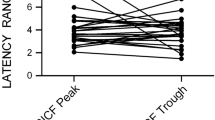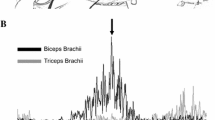Abstract
Transcranial magnetic stimulation (TMS) produces motor-evoked potentials (MEP) used to infer changes in corticomotor excitability. In humans, neck rotation can probe reticulospinal input on corticomotor output. This study investigated the effect of neck rotation on MEP duration in a proximal and distal upper limb muscle and compared responses between rest and preactivation. Single-pulse TMS to motor cortex was used to evoke MEPs at two stimulus intensities in 18 healthy adults (20–40 years). Surface electromyography recorded MEPs from the non-dominant biceps brachii (BB) and first dorsal interosseous (FDI). Participants were seated with the target muscle at rest or 10% preactivated, and head rotated ipsilateral, contralateral, or in neutral position. The primary outcome was MEP tail, defined as the mean difference in MEP duration between active and rest trials. Secondary outcomes were MEP duration and amplitude. MEP tail was modulated by neck rotation in the proximal BB (P = 0.03) but not distal FDI (P > 0.19), with shorter duration during ipsilateral or contralateral rotation relative to neutral. In a neutral neck position, MEP duration was prolonged by muscle preactivation and higher TMS intensities in the FDI and BB (P < 0.03). Neck rotation attenuated the prolongation of MEP duration during preactivation in the BB, but not the FDI. Neck rotation had no effect on MEP amplitude for either muscle (P > 0.05). Modulation of the late portion of the MEP by rotation of the neck could indicate subcortical projections to alpha-motoneuron pools are stronger in proximal than distal upper limb muscles. These findings may have relevance for using MEP duration as a neural biomarker in neurological diseases.



Similar content being viewed by others
References
Bradnam LV, Stinear CM, Byblow WD (2013) Ipsilateral motor pathways after stroke: implications for non-invasive brain stimulation. Front Hum Neurosci 7:184. https://doi.org/10.3389/fnhum.2013.00184
Brink EE, Suzuki I, Timerick SJ, Wilson VJ (1985) Tonic neck reflex of the decerebrate cat: a role for propriospinal neurons. J Neurophysiol 54:978–987. https://doi.org/10.1152/jn.1985.54.4.978
Brum M, Cabib C, Valls-Sole J (2015) Clinical value of the assessment of changes in MEP duration with voluntary contraction. Front Neurosci 9:505. https://doi.org/10.3389/fnins.2015.00505
Chen R, Garg R (2000) Facilitatory I wave interaction in proximal arm and lower limb muscle representations of the human motor cortex. J Neurophysiol 83:1426–1434. https://doi.org/10.1152/jn.2000.83.3.1426
Chothia M, Doeltgen S, Bradnam LV (2016) Anodal cerebellar direct current stimulation reduces facilitation of propriospinal neurons in healthy humans. Brain Stimul 9:364–371. https://doi.org/10.1016/j.brs.2016.01.002
Davidson AG, Buford JA (2006) Bilateral actions of the reticulospinal tract on arm and shoulder muscles in the monkey: stimulus triggered averaging. Exp Brain Res 173:25–39. https://doi.org/10.1007/s00221-006-0374-1
Ellis MD, Drogos J, Carmona C, Keller T, Dewald JP (2012) Neck rotation modulates flexion synergy torques, indicating an ipsilateral reticulospinal source for impairment in stroke. J Neurophysiol 108:3096–3104. https://doi.org/10.1152/jn.01030.2011
Kuypers HG (1964) The descending pathways to the spinal cord, their anatomy and function. Prog Brain Res 11:178–202. https://doi.org/10.1016/s0079-6123(08)64048-0
Lefaucheur J-P (2019) Chapter 37—Transcranial magnetic stimulation. In: Levin KH, Chauvel P (eds) Handbook of clinical neurology, vol 160. Elsevier, Amsterdam, pp 559–580. https://doi.org/10.1016/B978-0-444-64032-1.00037-0
Lemon RN (2008) Descending pathways in motor control. Annu Rev Neurosci 31:195–218. https://doi.org/10.1146/annurev.neuro.31.060407.125547
McCambridge AB, Stinear JW, Byblow WD (2014) A dissociation between propriospinal facilitation and inhibition after bilateral transcranial direct current stimulation. J Neurophysiol 111:2187–2195. https://doi.org/10.1152/jn.00879.2013
McCambridge AB, Stinear JW, Byblow WD (2018) Revisiting interhemispheric imbalance in chronic stroke: a tDCS study. Clin Neurophysiol 129:42–50. https://doi.org/10.1016/j.clinph.2017.10.016
Oldfield RC (1971) The assessment and analysis of handedness: the Edinburgh inventory. Neuropsychologia 9:97–113. https://doi.org/10.1016/0028-3932(71)90067-4
Pierrot-Deseilligny E (1996) Transmission of the cortical command for human voluntary movement through cervical propriospinal premotoneurons. Prog Neurobiol 48:489–517. https://doi.org/10.1016/0301-0082(96)00002-0
Roberts LV, Stinear CM, Lewis GN, Byblow WD (2008) Task-dependent modulation of propriospinal inputs to human shoulder. J Neurophysiol 100:2109–2114. https://doi.org/10.1152/jn.90786.2008
Smith V, Maslovat D, Carlsen AN (2019) StartReact effects are dependent on engagement of startle reflex circuits: support for a subcortically mediated initiation pathway. J Neurophysiol 122:2541–2547. https://doi.org/10.1152/jn.00505.2019
Srivastava UC, Manzoni D, Pompeiano O, Stampacchia G (1984) Responses of medullary reticulospinal neurons to sinusoidal rotation of neck in the decerebrate cat. Neuroscience 11:473–486. https://doi.org/10.1016/0306-4522(84)90038-1
Stinear JW, Byblow WD (2004) The contribution of cervical propriospinal premotoneurons in recovering hemiparetic stroke patients. J Clin Neurophysiol 21:426–434. https://doi.org/10.1097/00004691-200411000-00006
van den Bos MA, Geevasinga N, Menon P, Burke D, Kiernan MC, Vucic S (2017) Physiological processes influencing motor-evoked potential duration with voluntary contraction. J Neurophysiol 117:1156–1162. https://doi.org/10.1152/jn.00832.2016
Wilson VJ, Ezure K, Timerick SJ (1984) Tonic neck reflex of the decerebrate cat: response of spinal interneurons to natural stimulation of neck and vestibular receptors. J Neurophysiol 51:567–577. https://doi.org/10.1152/jn.1984.51.3.567
Author information
Authors and Affiliations
Contributions
Conceptualization, methodology: ABMC. Formal analysis and investigation: ABMC, KH, KL, KP, and KW. Writing—original draft preparation: ABMC and LVB. Writing—review and editing: ABMC and LVB.
Corresponding author
Ethics declarations
Conflict of interest
The authors declare that they have no conflict of interest.
Additional information
Communicated by Francesco Lacquaniti.
Publisher's Note
Springer Nature remains neutral with regard to jurisdictional claims in published maps and institutional affiliations.
Rights and permissions
About this article
Cite this article
McCambridge, A.B., Hay, K., Levin, K. et al. Neck rotation modulates motor-evoked potential duration of proximal muscle cortical representations in healthy adults. Exp Brain Res 238, 2531–2538 (2020). https://doi.org/10.1007/s00221-020-05887-8
Received:
Accepted:
Published:
Issue Date:
DOI: https://doi.org/10.1007/s00221-020-05887-8




